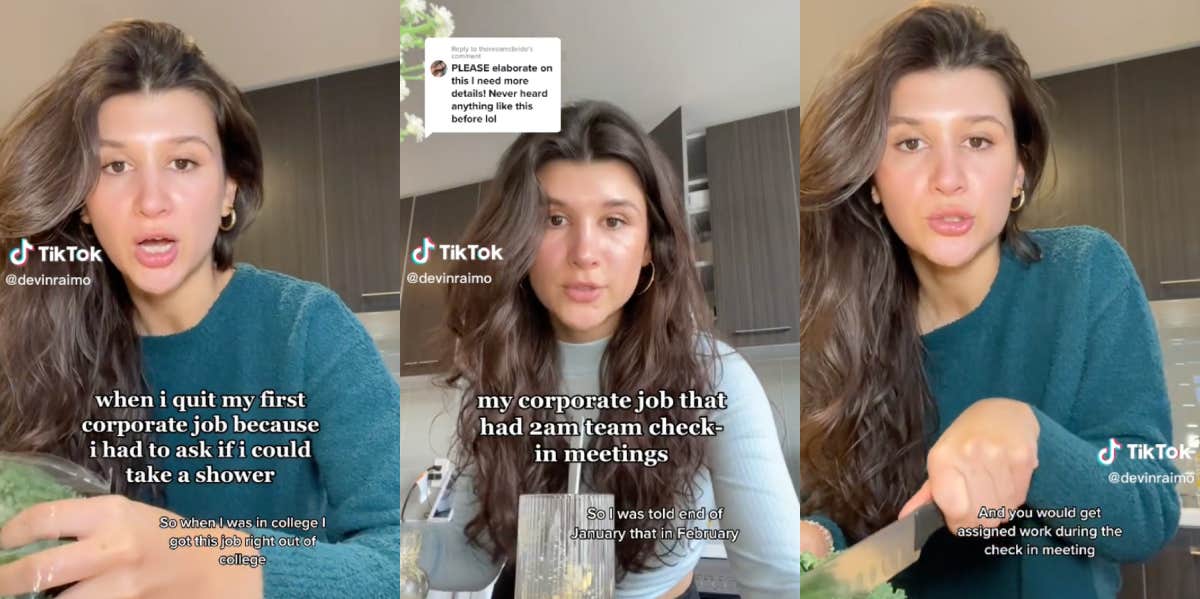Woman Says Her Corporate Job Made Her Team Have A 'Check-In Call' At 2 AM — 'You Would Get Assigned Work During The Calls'
She was unable to have a proper work-life balance and was instead forced to work around the clock at her corporate job.
 TikTok
TikTok For many, working a nine-to-five is just enough for them, but one woman was forced to work around the clock at a job she got right after graduating from college.
In a video, TikTok user Devin shared with her followers the dystopian work conditions that eventually led her to quit a position she had at one of the "Big Four," which refers to one of the four largest accounting firms in the United States.
She was forced to attend early morning 'check-in calls,' where all of the team members were assigned work to do.
"I got this job right out of college that seemed like a really good job," Devin began in her video, which has amassed over 3.5 million views. "I knew that the hours were going to be long, especially at certain times in the year."
However, when talking to all of the other team members, she was reassured that it wouldn't be too bad. At first, Devin acknowledged that they were right and that the hours were manageable. "I would be working until ten o'clock."
After getting into the groove of the workday, Devin was suddenly told by her boss that she and all of the other team members would need to participate in meetings that were to take place at 2 a.m., where all of the employees would be assigned work that needed to get done right after the call was over.
"It just got so weird," she continued. "We all had to tell each other when we were showering so everyone knew that you didn't accidentally fall asleep." Devin pointed out that it was incredibly bizarre how concerned management was about whether or not the team members were in the shower when they were inactive on the call.
The final straw that caused Devin to eventually quit came after she had requested to take time off months in advance for her sister's wedding. While she said her company knew about her day off, on the day of the wedding, she was receiving a barrage of texts and emails about work.
"I was like these people are not okay to care that much that you're calling me nonstop at my sister's wedding," she said. When she brought it up with management, they tried to tell her that other team members have still worked on important days.
Following that incident, Devin immediately put in her two-week notice and joked that after doing so, she would "need a decade" to recover from the way she was treated at the company.
Devin explained that the company created mandatory meetings to make sure people were still online and working.
In a follow-up video, Devin provided more information on why the company demanded that team members be on a 2 a.m. call. She explained that toward the end of January 2022, she was told that all employees were supposed to be online at 11 a.m.
In March 2022, the company changed the policy and demanded that all employees be online at 2 a.m. To make sure that everyone was online, they would schedule the check-in meetings to make sure no one had fallen asleep and was actually working.
"The hours got gradually later and later because they would be like, 'Oh, after the 2 a.m. check-in meeting, can you do this?' And it would be something that took an hour so now I was up until 3:30 a.m.," Devin revealed.
At one point, Devin said that she was put on a new team to replace another employee that quit because he "couldn't emotionally handle working past midnight," which she pointed out was a valid reason to leave the company.
"The whole idea was that certain months of the year your hours were light so it kind of evened out. But it didn't even out because you would be working until maybe 3 p.m. when it wasn't busy, but that didn't make up for working until 3 a.m."
There is definitely no corporate job on the planet that should be requiring their employees to essentially work 24 hours around the clock, especially when it's been proven that employees should be having a good work-life balance.
According to LinkedIn, studies show that employees with a work-life balance are 21% more productive than people with a poor work-life balance. They can come to work with an open, well-rested mind. When employees feel that their employer values their personal life and well-being, they are more likely to feel satisfied with their job.
Nia Tipton is a Brooklyn-based entertainment, news, and lifestyle writer whose work delves into modern-day issues and experiences.
